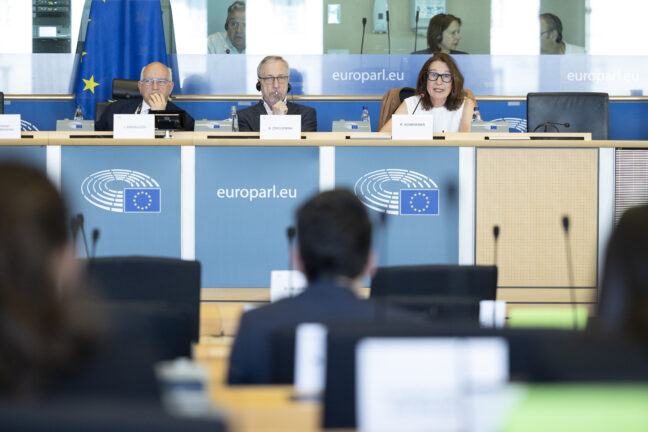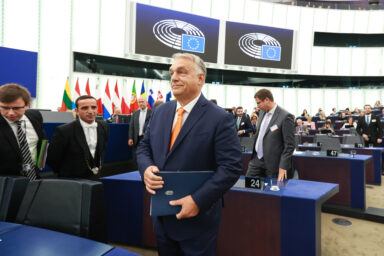Online threats are on the rise, spyware is becoming the new normal, disinformation is eroding trust. Journalists are facing surveillance, censorship, and vexatious litigation. However, help may be on the way: the European Media Freedom Act (EMFA) is to take full effect this August.
These urgent issues dominated the public hearing held by the European Parliament’s Committee on Civil Liberties, Justice and Home Affairs (LIBE) in coordination with the Culture and Education Committee (CULT). The session brought together EU officials, legal experts, and journalists to confront the accelerating assault on media freedom across the continent.
Strengthening legal safeguards for journalists
Opening remarks from LIBE Chair Javier Zarzalejos (EPP/ES) and CULT Vice-Chair Bogdan Andrzej Zdrojewski (EPP/PL) set the tone of the debate. What followed was a frank – and often alarming – discussion on the legal, political, and economic fragilities threatening independent journalism.
Renate Nikolay, Deputy Director-General of DG CONNECT, underscored the European Commission’s commitment to defending press freedom, but did not sugarcoat the challenges. She underlined the growing use of spyware, online threats, and the need for a full and ambitious implementation of the EMFA. The law, once fully in force this summer, is to establish rigorous controls.
Ms Nikolay emphasised that “EMFA will introduce strict safeguards” around the use of surveillance technology against journalists, to be allowed only in exceptional criminal cases. The Deputy Director also mentioned that the new law must be implemented with ambition and consistency, backed by complementary efforts like the Digital Services Act and the European Democracy Shield, aimed at strengthening media pluralism, societal resilience and platform accountability.
You might be interested
But the political will behind the EMFA is already being tested. Renate Schroeder, Director of the European Federation of Journalists, echoed the urgency of action and warned that several member states are dragging their feet or even warping the EMFA’s intent. She pointed to Cyprus, where draft legislation, while purportedly transposing the regulation, authorises surveillance of journalists and their contacts. The initiative drew criticism from journalists, media experts, and even the country’s own Bar Association, as unconstitutional and dangerous. Schroeder called for “transparency and urgency” in EMFA transposition, stressing that delays and loopholes only embolden those seeking to intimidate the press.
SLAPPs and legal loopholes
From a different standpoint, Professor Justin Borg-Barthet of the University of Aberdeen highlighted persistent gaps in anti-SLAPP (Strategic Lawsuits Against Public Participation) protections. He recalled the 2017 assassination of Maltese journalist Daphne Caruana Galizia, whose work exposing corruption made her a frequent target of retaliatory lawsuits before her murder.
Although Mr Borg-Barthet considered anti-SLAPP legislation an achievement, he explained that the current EU framework remains insufficient. Criminal SLAPPs are still not addressed, jurisdictional confusion persists, and many legal systems fail to deter abuse. He also pointed to the Brussels Ia Regulation (it determines the courts of which member state have jurisdiction to decide on civil and commercial disputes with an international element) as something that requires attention, noting that over 90 per cent of SLAPP cases involve multiple EU jurisdictions. Mr Borg-Barthet also flagged that the Rome II Regulation, which governs applicable law in cross-border civil cases, lacks a uniform rule on how to handle disinformation cases. Unless new laws clearly define and disarm SLAPP tactics, repressive actors will continue to weaponise procedure against the truth.
Surveillance and censorship
Other parts of the discussion sharpened the focus on direct threats to journalists, including illegal surveillance, economic instability and information manipulation. Jean-Paul Marthoz, coordinator of the Council of Europe’s latest report on press freedom, described a deteriorating media environment where governments abuse national security rhetoric to justify crackdowns, leading to fear and self-censorship among journalists.
Defend journalism and media now, or democracy will be at stake. Elena Rodina, Media Freedom Rapid Response Consortium
Elena Rodina, coordinator of the Media Freedom Rapid Response Consortium, reported a 35 per cent surge in censorship cases over the past year. She also highlighted that in 75 per cent of spyware attacks, the perpetrators remain unidentified. In Serbia, Ms Rodina noted, surveillance has become so pervasive that many journalists assume they are being watched, and they often are. Amnesty International has documented the Serbian police and intelligence services’ use of advanced spyware to infiltrate journalists’ devices.
The Consortium coordinator also pointed to a recent high-profile case of Francesco Cancellato, editor-in-chief of the Italian investigative outlet fanpage.it, who was targeted with the spyware Graphite via WhatsApp. In response, she outlined a four-point plan: strengthen legislation to hold tech platforms accountable; repeal anti-media laws; fully implement EMFA safeguards on spyware and surveillance; and firmly condemn any form of state-sponsored spying on journalists. Rodina’s warning was unequivocal: “Defend journalism and media now, or democracy will be at stake.”
The economics of silence
Lastly, Oliver Money-Kyrle of the International Press Institute followed with a stark analysis of the economic collapse underpinning the disinformation quagmire. Independent media outlets are starving for resources, caught between declining revenues and the growing threat of bankruptcy from costly lawsuits. At the same time, tech monopolies like Google and Meta extract immense profits from journalistic content while evading responsibility. Algorithms built to maximise engagement reward sensationalism over truth, warping public discourse. Mr Money-Kyrle criticised platforms like Meta for abandoning independent fact-checking in favour of ‘community moderation’.
EU should treat news as a vital economic sector. Oliver Money-Kyrle, International Press Institute
Mr Money-Kyrle also argued that “EU should treat news as a vital economic sector”. He pointed to a recent working paper that supports this urgency, estimating that Google and Meta owe U.S. news publishers between 11.9 and 13.9 billion USD annually. The figure is based on the proposed Journalism Competition and Preservation Act (JCPA), which would allow collective bargaining to rebalance power between platforms and publishers.
The hearing made one thing plain: the challenges to media freedom are not abstract or distant. With the EMFA about to become enforceable law, the EU faces a decisive moment.











